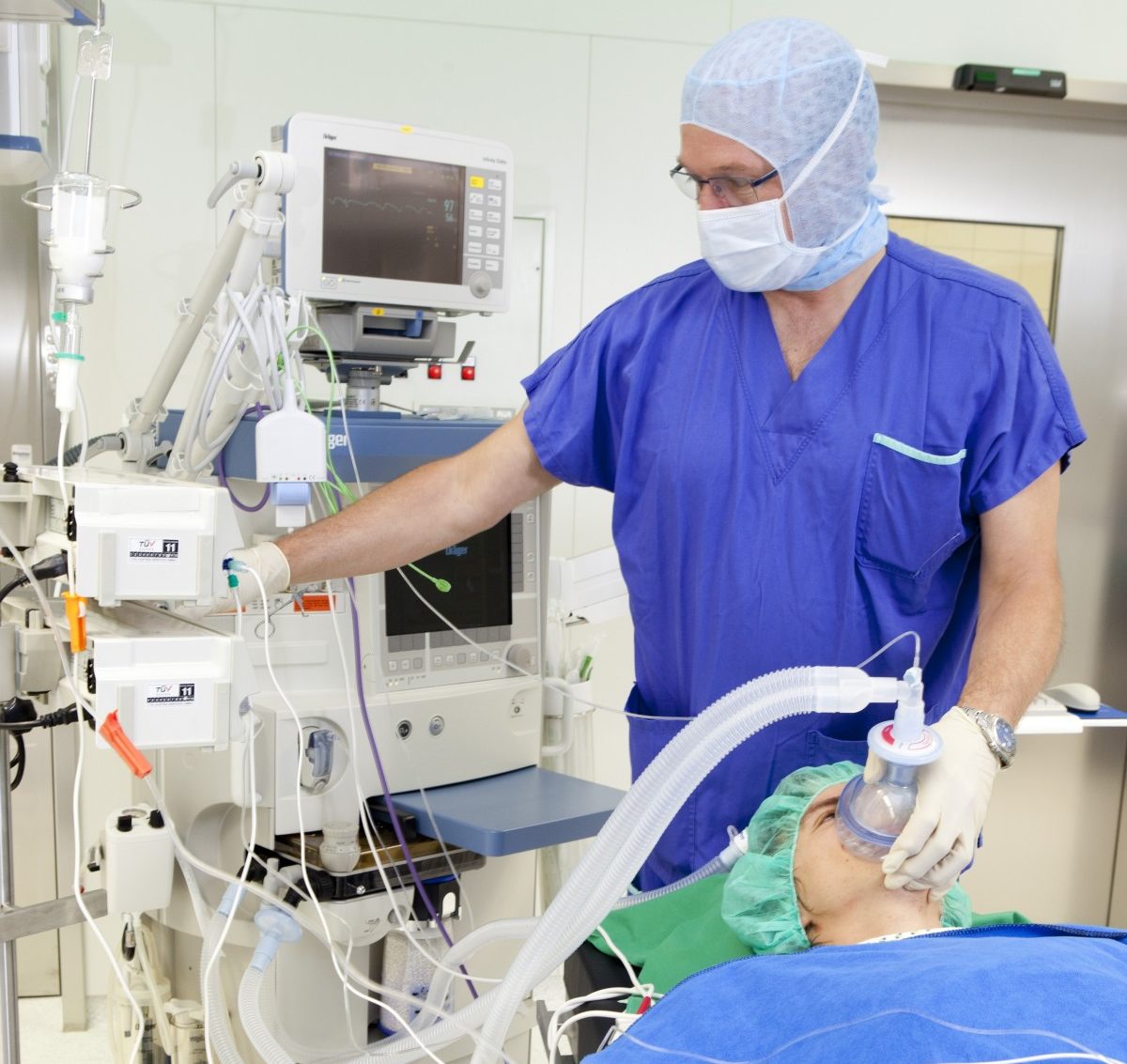Nurse Types / CRNA
Certified Registered Nurse Anesthetists (CRNAs) provide critical care to patients in their hour of need. They administer anesthesia before and during medical procedures while ensuring the comfort and safety of their patients. Given the delicate nature of their work, CRNAs must have extensive education and experience.
Most CRNAs work independently and have the highest earning potential among advanced practice registered nurses (ARPNs).
If you’re interested in being a nurse anesthetist and looking to learn about education requirements, duties, certification, licensing, and advancement opportunities, this guide is for you.
In this article we discuss:
- What is a certified registered nurse anesthetist (CRNA)?
- What do CRNAs do?
- Where do CRNAs work?
- What are closely related fields?
- How do you become a nurse anesthetist in 3 steps?
- What are additional requirements of CRNAs?
- What are the salary and career outlooks for nurse anesthetists?
What is a certified registered nurse anesthetist (CRNA)?
A CRNA is an advanced practice registered nurse trained and certified to administer anesthesia before and during medical operations, such as surgery, emergency care, pain management, or labor and delivery. A nurse anesthetist provides similar services as an anesthesiologist; however, the latter may provide a collaborative oversight to ensure patients’ best practices.
According to AANA (the American Association of Nurse Anesthetists), most hands-on anesthesia care in the U.S. is provided by CRNAs.
Qualities of a successful CRNA
CRNAs must be compassionate to help ease patient fears about going under anesthesia. They also must think quickly on their feet to solve real-time problems once patients are anesthetized.
Other qualities of a successful CRNA include:
- Calm under pressure
- Respectful
- Strong communicator
What do CRNAs do?
As a CRNA, you are responsible for numerous tasks, including prepping patients who may need anesthesia, caring for patients already anesthetized, monitoring vital signs, managing ventilators, and administering medications.
CRNAs can also be tasked with administrative duties, including managing finances, ordering medications, and training new staff. They may hold positions with state nursing boards, act as instructors in course development, or be part of organizations that set medical standards.
Bottom line, a nurse anesthetist works in varied and exciting settings. They go home knowing they’ve advocated, cared for, and helped patients live to their fullest.
A day in the life of a CRNA
Your day-to-day routines can vary depending on where you work and the patients you’ll be responsible for during your shift. Some of the most common duties and responsibilities of CRNAs include:
- Setting up surgical rooms for operation
- Organizing required medications
- Examining patients’ medical history and requesting diagnostic studies
- Developing anesthetic plans
- Discussing any risks and side effects with the patient and their families
- Prepping and administering anesthesia
- Performing epidural, spinal, or nerve blocks
- Offering patient care before, during, and after medical procedures
- Monitoring vital signs during and after medical procedures to avert and manage complications
- Responding to emergencies with life support techniques, medications, or airway management
- Participating in therapeutic or diagnostic procedures
- Diagnosing and delivering chronic or acute pain management
NURSE TIP

Where do CRNAs work?
A report from the Association of America Medical Colleges (AAMC) projects that the nation will face a shortage of 54,100 – 139,000 physicians by 2033.
With such deficits, the demand for CRNAs will keep increasing across the United States. Thus, a CRNA is needed in different healthcare environments, including:
- Medical and surgical hospitals
- Outpatient surgery care centers
- Dental offices
- Plastic surgery centers
- Pain management centers
- Public health centers, and other medical offices
- United States military facilities
What are closely related fields?
There are many healthcare careers in anesthesia you can explore if becoming a CRNA isn’t your preference. One of the most common is an anesthesia technician (AT). ATs support anesthesiologists and nurse anesthetists with their duties.
Most anesthesia technicians hold an associate’s degree and must be certified to work in the field.
How do you become a nurse anesthetist in 3 steps?
CRNAs are registered nurses (RNs) who specialize in anesthesia. You must complete the correct level of nursing education and then pass the NCLEX exam to earn your RN license. Follow these three steps to get started on your journey to becoming a CRNA.
Step 1- Become a registered nurse (RN)
To become an RN, you must first earn an Associate Degree in Nursing (ADN) or a Bachelor of Science in Nursing (BSN). This is the education level needed to earn your RN license. However, to work as a CRNA, you must pursue an advanced degree.
Earn a degree
Currently, you need a Master of Science in Nursing (MSN) and national certification to become a CRNA. However, this is will change in 2025 when a Doctor of Nursing Practice (DNP) will be the prerequisite to joining the field.
Before you can apply to a Master of Science in Nursing (MSN) program, you must complete your BSN.
The recent directives by the Council on Accreditation of Nurse Anesthesia (COACRNA) Educational Programs now require all nurse anesthesia degree programs to include doctoral degrees. They will also need all the students pursuing nurse anesthesia’s MSN programs at the time to transition to doctoral programs.
There are bridge programs to help you advance your degree with less time spent in school:
Pass the NCLEX exam
Passing the NCLEX exam is the final step to becoming a registered nurse. The test evaluates whether you’re ready to work as an entry-level RN.
Test questions are designed using Computerized Adaptive Testing methods. For every question you answer correctly, subsequent questions become more difficult.
If you fail the test on your first attempt, you can try again after a 45-day waiting period.
Step 2 – Accumulate experience
After you have your RN licensure, gaining at least one year of experience in an emergency room or intensive care unit is required before you can become certified.
Helpful skills and experience
Since most anesthesia is administered to patients undergoing surgeries and other medical procedures in hospitals and other specialty medical centers, working as an RN in these environments is best suited to building your experience level.
CRNAs must have keen observation skills and think quickly on their feet if patients experience complications from anesthesia.
Changing specialty to a CRNA
Going from an RN to a CRNA is a logical step on the nursing career ladder. If you decide you want to change your nursing specialty from RN to CRNA, you must first have a minimum of a bachelor’s degree.
From there, you’ll need to pursue your master’s or doctoral degree to qualify for CRNA certification.
Get job matches in your area + answers to all your nursing career questions

Step 3 – Obtain certifications
After graduating from an MSN program, you must pass your NCE (National Certification Examination) offered by the NBCRNA (National Board of Certification and Recertification for Nurse Anesthetists).
NCE test comprises 100–170 computerized questions across various topics, including 30 random questions. The cost is $725.
To obtain the certification, you should apply for the NCE exam, pay the fee, provide appropriate documentation to NBCRNA, and then schedule to take the examinations at your testing center.
Note, you have a total of 3 hours to complete the NCE exam. Questions relate to:
- 25% of basic sciences
- 15% of equipment, technology, and instrumentation
- 30% of the basic principles of anesthesia
- 30% of the advanced tenets of anesthesia
According to NBCRNA reports, 84% of graduates pass the NCE exam on their first try, after which, they can recertify through the CPC (Continued Professional Certification) program every four years.
If you pass, your certification’s verification is sent to your state board of nursing where you’ll complete additional steps as needed to become a state-licensed CRNA.
All states (except Pennsylvania and New York) require CRNAs to be licensed as APRNs (advanced practice registered nurses).
To qualify for the state licensure, you must provide a completed application, associated fee, and proof of CRNA certification and program completion to your state board of nursing. Based on the state requirements, you may submit your physician supervision form and apply for prescription authority.
What are additional requirements of CRNAs?
To maintain designations, CRNAs must renew their national certification via NBCRNA every 2 or 4 years. To qualify for renewal, you must:
- Complete 40+ continuing education credits
- Hold a current, unencumbered RN license
- Prove you have engaged in anesthesia during the certification period
- Verify you don’t have physical, mental, and other problems that could interfere with anesthesia practices
Within 2 years, the nurse anesthetist must complete an online check-in to maintain their state license.
Within 4 years, you must complete:
- 60 Class A credits on tasks directly linked to improvement or delivery of anesthesia care
- 40 Class B credits on activities related to anesthesia practice or professional development subjects, such as research, public education, and patient safety
- Four core modules: Physiology, applied clinical pharmacology, airway management, pathophysiology, and anesthesia technology and equipment
At the end of 8 years, you must take a CPC test comprising 150 questions, designed to test knowledge in the four core modules of CRNA practices.
What are the salary and career outlooks for nurse anesthetists?
According to the U.S. Bureau of Labor Statistics (BLS), CRNA’s earn an average of $205,770 per year. The career is also projected to grow in demand by 40% from 2021 to 2031.
Salary depends on location, the type of facility in which you work, your experience, and education. Nurse anesthetists have a relatively higher earning potential in the nursing arena compared to APRNs in other specialties.
Get job matches in your area + answers to all your nursing career questions

Job satisfaction
An overwhelming majority – 84% – of CRNAs said they were somewhat or very satisfied with their current positions, according to an AANA survey. CNRAs who practiced independently had the highest level of job satisfaction.
Next steps
CRNAs have several options for advancing their nursing careers. With a Doctor of Nursing Practice (DNP) degree, you can become a clinical or didactic educator or a program director.
You also can pursue specialty certifications as a CRNA, which requires taking continuing education courses and obtaining certifications to demonstrate competence in your area of expertise.
Not sure which direction to take your career? You can chat with experienced CRNAs to ask questions about your options.
FAQs
A CRNA is an advanced practice registered nurse trained and certified to administer anesthesia before medical operations, such as surgery, emergency care, pain management, or labor and delivery.
CRNAs make about $205,770 per year.
They are responsible for numerous tasks, including prepping patients who may need anesthesia, caring for patients already anesthetized, monitoring vital signs, managing ventilators, and administering medications.
Get job matches in your area + answers to all your nursing career questions

Sources
- Become a CRNA. aana.com. Accessed November 8, 2022.
- Behind the Lens: A History in Pictures. pbs.org. Accessed November 8, 2022.
- Computerized Adaptive Testing (CAT). nclex.com. Accessed November 8, 2022.
- NBCRNA Certification. nbcrna.com. Accessed November 8, 2022.
- New AAMC Report Confirms Growing Physician Shortage. aamc.org. Accessed November 8, 2022.
- Occupational Employment and Wages, Nurse Anesthetists. bls.gov. Accessed November 8, 2022.
- Surgical Assistants and Technologists. bls.gov. Accessed November 8, 2022.
- Work patterns, socio-demographic characteristics, and job satisfaction of the CRNA workforce – Findings from the 2019 AANA survey of CRNAs. sciencedirect.com. Accessed November 8, 2022.
